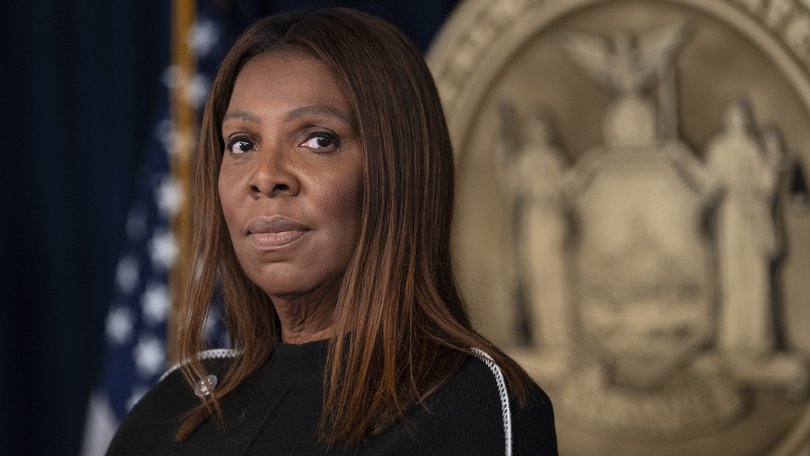Judge tosses Comey and James charges, ruling Trump-installed prosecutor was unlawfully appointed
A federal judge has thrown out criminal cases against James Comey and Letitia James, ruling that Donald Trump’s hand-picked prosecutor had no legal authority to charge them.

A federal judge has tossed out separate criminal charges against Former FBI Director James Comey and New York Attorney General Letitia James, saying the prosecutor’s appointment was invalid — a major blow to the president’s effort to make the criminal justice system do as he pleases.
The twin rulings Monday by Judge Cameron McGowan Currie are the most significant setback yet for President Donald Trump’s effort to dictate how the Justice Department handles criminal cases, but the dismissals are unlikely to be the last word on an issue many lawyers expect to reach the Supreme Court.
The judge’s decisions centre on the unusual nature in which Lindsey Halligan was picked by Mr Trump and Attorney General Pam Bondi to become a US attorney and proceed on her own in a matter of days to indict two of the president’s most reviled targets.
Sign up to The Nightly's newsletters.
Get the first look at the digital newspaper, curated daily stories and breaking headlines delivered to your inbox.
By continuing you agree to our Terms and Privacy Policy.Mr Currie ruled Monday to dismiss the two charges against Mr Comey, writing: “I agree with Mr Comey that the attorney general’s attempt to install Ms Halligan as interim US attorney for the Eastern District of Virginia was invalid. And because Ms Halligan had no lawful authority to present the indictment, I will grant Mr Comey’s motion and dismiss the indictment without prejudice.”
She made a similar finding in the case against Ms James, who was charged with misleading financial institutions to get a better rate on a mortgage. Mr Comey was charged with making a false statement and obstruction of a congressional proceeding.
The administration is likely to appeal the judge’s ruling, and perhaps try to refile the charges, rather than acquiesce to the death of two high-profile cases that the president has egged into existence.
Ms James’ lawyer, Abbe Lowell, said the court ruling showed Mr Trump “went to extreme measures to substitute one of his allies to bring these baseless charges after career prosecutors refused. This case was not about justice or the law; it was about targeting Attorney General James for what she stood for and who she challenged.”
Earlier this fall, Mr Trump rushed to oust the career US attorney in the Eastern District of Virginia who had expressed concern that there was not sufficient evidence to indict Mr Comey and Ms James.
The president replaced him with Ms Halligan, a former White House staffer and insurance lawyer who had no previous experience as a prosecutor.
When Ms Halligan did the president’s bidding by hurrying to charge Mr Comey and Ms James, it was a generational erosion in the tradition of the White House keeping distance from the affairs of the Justice Department.
Four days after taking office, Ms Halligan secured an indictment against Mr Comey, charging him with lying to and obstructing Congress during testimony he gave in September 2020 about whether, as FBI director, he had authorised leaks to the media about sensitive political investigations.
Not long after, Ms James was charged with bank fraud and making false statements in loan documents for a home she had purchased in Norfolk, Virginia.
Mr Currie more or less accused Mr Trump and Ms Bondi of circumventing the law through the manner in which Ms Halligan was elevated to oversee one of the country’s most important federal prosecutors’ offices.
The judge noted that Ms Halligan and her predecessor, Erik Siebert, were serving in an interim capacity.
But the attorney general is permitted to appoint only one interim US attorney to serve for a temporary 120-day period, Mr Currie noted. The law does not permit the appointment of successive interim prosecutors, the judge said, or else the White House could simply keep installing pliant people in powerful positions and get around the constitutional requirement for the Senate to confirm them.
Mr Currie wrote that if she did not dismiss the indictments, the consequences to the criminal justice system would be enormous.
“It would mean the government could send any private citizen off the street — attorney or not — into the grand jury room to secure an indictment so long as the attorney general gives her approval after the fact,” she wrote.
“That cannot be the law.”
Mr Currie, an appointee of President Bill Clinton who normally sits in South Carolina, was assigned to hear the question of Ms Halligan’s appointment after the local federal judges were forced to step back to avoid any appearance of conflict in deciding on the fate of the US attorney they routinely deal with.
Other federal judges have already ruled that Mr Trump’s Justice Department unlawfully used similar procedural maneuvers to put loyalists in place at three other US attorneys’ offices.
Those include Alina Habba, who was put in charge of the US attorney’s office in New Jersey; Sigal Chattah, who was named the acting US attorney for Nevada; and Bilal Essayli, whom Mr Trump put in the top job at the US attorney’s office in the Central District of California.
But Ms Halligan’s involvement in the Ms James and Mr Comey cases was in many ways unique. In both matters, she appeared alone in front of the grand juries that returned indictments and was the sole prosecutor to have formally signed the charging documents. Because no other colleagues joined her in presenting to grand juries, Mr Currie ruled that the indictments she secured were invalid.
Although the charges against Mr Comey and Ms James were brought separately, their lawyers joined forces in challenging Ms Halligan’s appointment.
This article originally appeared in The New York Times.
© 2025 The New York Times Company
Originally published on The New York Times
